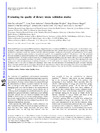Identificador persistente para citar o vincular este elemento:
https://accedacris.ulpgc.es/jspui/handle/10553/44744
| Título: | Evaluating the quality of dietary intake validation studies | Autores/as: | Serra-Majem, Lluis Frost Andersen, Lene Henríque-Sánchez, Patricia Doreste-Alonso, Jorge Sánchez-Villegas, Almudena Ortiz-Andrelluchi, Adriana Negri, Eva La Vecchia, Carlo |
Clasificación UNESCO: | 32 Ciencias médicas 3206 Ciencias de la nutrición |
Palabras clave: | Validation Studies Nutrient Intake Quality Score |
Fecha de publicación: | 2009 | Publicación seriada: | British Journal of Nutrition | Resumen: | Within the EURopean micronutrient RECommendations Aligned Network of Excellence (EURRECA), a scoring system was developed to assess the quality of dietary intake validation studies. The scoring system included three steps. The first step was to give each study a quality score, which included five components: sample size, statistics used, data collection procedure, consideration of seasonality and supplement use. Scores ranged from 0 to 7, and validation studies classified as very good ( > or = 5), good (5-3.5), acceptable/reasonable (3.5-2.5) and poor ( < 2.5). The second and third steps included an adjustment/weighting of the correlation coefficient according to the quality score and moreover a rating of the adjusted/weighted correlation. The scoring system was tested in 124 validation studies that included at least one vitamin. Only 5.6 % of the 124 studies were judged to be of very good quality according to the quality score, 41.9 % of good quality and 16.9 % had a poor rating. When adjusting for the study quality scores, crude and adjusted mean correlations of vitamins A, C, D and E intakes were similar, but the percentage of correlation values classified as poor or very good was higher after adjustment. These results show the importance of considering the quality of studies validating dietary assessment methods and the correlations obtained for the micronutrient of interest when interpreting effects observed in epidemiological studies using dietary assessment methods. Without a doubt, this subject constitutes a key topic for research in nutritional epidemiology. | URI: | https://accedacris.ulpgc.es/handle/10553/44744 | ISSN: | 0007-1145 | DOI: | 10.1017/S0007114509993114 | Fuente: | British Journal of Nutrition [ISSN 0007-1145], v. 102 (sup. 1), p. S3-S9, (Diciembre 2009) |
| Colección: | Artículos |
Citas SCOPUSTM
114
actualizado el 08-jun-2025
Citas de WEB OF SCIENCETM
Citations
124
actualizado el 15-feb-2026
Visitas
247
actualizado el 15-ene-2026
Descargas
185
actualizado el 15-ene-2026
Google ScholarTM
Verifica
Altmetric
Comparte
Exporta metadatos
Los elementos en ULPGC accedaCRIS están protegidos por derechos de autor con todos los derechos reservados, a menos que se indique lo contrario.
